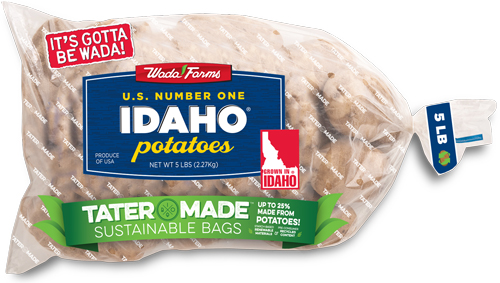
Sustainable Packaging Evolution
When it comes to potatoes and sustainability, it’s in the bag for Wada Farms.
The potatoes are in the bag and the bag’s material includes up to 25% potato starch.
It’s an effort by Wada Farms, based in Pingree, Idaho, to reduce their carbon footprint and increase their commitment to sustainable practices by using potato starch in the creation of their polyfilm bags.
This past November they introduced a 5-pound polyfilm bag they are calling the eco-friendly Tater Made bag.
It’s currently being packed and shipped to major retail chains in the company, most notably Walmart,” said Chris Wada, director of marketing for Wada Farms. “It’s going to multiple retailers and not limited. We’re open to expanding it with whoever, but at this point the largest private label customer is Walmart.”
Wada said that Wada Farms has been dedicated to finding sustainable solutions for their retail customers for years but that the sustainability doesn’t come cheap and it also requires a commitment from the retailers.
He said that the cost of the Tater Made material is slightly higher than the cost of traditional petroleum-based polyfilms.
“The first thing to understand is to know that the cost is high and then to have commitment from both supplier and retailer to sustainability,” Wada said. “In terms of added value, it’s just being conscious and authentic to what you stand for in terms of sustainability and what you’re doing even at a cost to help offset your overall carbon footprint.”
He said that plans are in the works for a 10-pound Tater Made bag.
Wada said it was a slow and methodical journey to bring the Tater Made bag to completion. The journey that began more than five years ago during a conversation with Brad LaPray, the owner of a start-up company called BiologiQ.
LaPray was looking for space to conduct research and development and Wada Farms’ original shipping facility in Blackfoot, Idaho, was empty after the completion of their new shipping facility in Pingree.
Along with an office in Blackfoot, BiologiQ has offices in Japan, Thailand and Indonesia. The company manufactures bioplastic from waste potato starch in southeast Idaho and from tapioca starch in southeast Asia.
LaPray said that BiologiQ uses its own proprietary technology to manufacture a starch resin pellet they call eco starch resin (ESR).
He said that the pellets would traditionally be called thermal plastic starch (TPS) but BiologiQ identifies its product as ESR because the pellet is more similar to a polymer resin used like polyethylene than a TPS.
“One of the key points to our ESR is they have extremely low moisture content so they can be processed on existing traditional plastic equipment,” LaPray said.
After manufacturing the pellets BiologiQ then blends the ESR pellets with other pellets. The blending process could include other bioplastic pellets or traditional pellets made from fossil fuel.
BiologiQ is supplying the blend to Emerald Packaging, Wada Farms’ bag manufacturer in California.
“They’re using their existing equipment with our blend of pellets that contain ESR to make these sustainable bags instead of pure fossil fuel bags,” LaPray said.
LaPray said that he is working with several companies for a number of applications. One product that has shown promise is a biodegradable mulch film but LaPray is wary to discuss biodegradability in any form until he has conclusive test results.
“It has a tremendous amount of potential and right now there are a few farms that we have sent materials and they’re testing that to determine the rate of biodegradation,” LaPray said.
Biodegradation rates vary depending on temperature and the amount of micro-organisms in the soil, he said.
A lab in New Mexico is currently testing the mulch film under a variety of conditions and LaPray hopes to have the results in a year.
While BiologiQ continues to develop new uses for its ESR pellets, LaPray has started looking for possible sites for a new manufacturing facility in eastern Idaho.
At the same time, Chris Wada and Wada Farms are moving forward with plans for the 10-pound Tater Made bag.
Wada said that it’s been fun and exciting bringing the bags to market and credits Emerald Packaging and the Idaho Package Company with helping bring the inaugural job to completion.
He said that they’ve had good feedback from consumers and retailers but there remains much to do.
“We’re not at the point of saying this is going to replace all poly tomorrow,” Wada said. “It’s a gradual process and for those in support of sustainability and finding value within those efforts, it’s time to support it.”
Photo: Wada Farms







